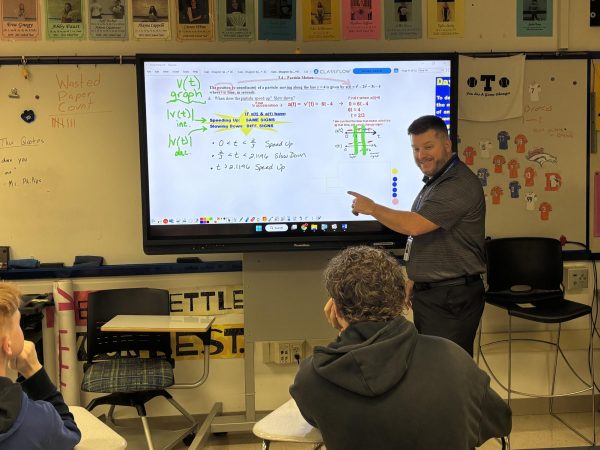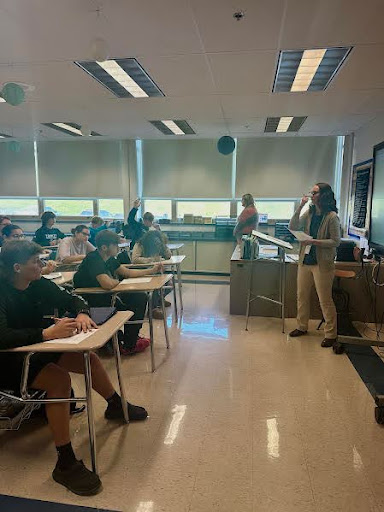How to cover all bases for this year’s research paper
This image was accessed via Google Images under the Creative Commons License
Consider approaching this year’s research paper without the usual doom-and-gloom mindset. A positive mindset makes the essay process so much easier.
The time ticks away as sweat drips down, threatening to undermine years of preparation for this moment with a single drop. Hours of hardwork and months of training have lead to now, and though there are no spectators, the pressure to succeed is palpable. Fingers fly furiously across the keyboard as they race to finish the main body paragraphs before the class period ends. This is not the average March Madness competition; it’s research paper season.
While they may be the bane of some students’ existence, annual research essays are no joke. Requiring intense academic research and meticulous attention to grammatical mechanics, they are as close to a sport as English class gets. The seemingly endless marathon of finding credible sources, citing them properly and developing a response can feel overwhelming, which is why it can be helpful to break up the research paper process into three parts: the tip off, halftime and the post-game.
The tip off
The tip off, be it in a basketball game or an English classroom, is of vital importance. The first play can sometimes determine the course of the game. For academic papers, approach research time like the tip off; this is the moment to decide the direction the essay will take. If possible, choose an appropriate research topic that fits personal interests.
The next step is to formulate the points for a strong thesis statement. This will likely be the most important step because it determines the content of the main body paragraphs.
Now it is time to research and organize the information so it will be useful when it comes time to write the actual essay. Here are a few dos and don’ts for organizing a strong research paper:
- Do find credible sources and a mixture of facts and statistics. According to Sophomore Sara Setto this will, “keep your paper as information packed as possible while also keeping it interesting [for the reader].”
- Do take notes. Instead of just breezing through article after article, putting in effort to annotate relevant information makes it easier to quote and write in-text citations later. It doesn’t have to be fancy. Simple note-taking skills like Talking to the Text or highlighting can make the difference between a home-run essay and a dud paper.
- Do update the works cited frequently. Utilize classroom resources (such as MLA format handouts or even the teacher!) to compose a works cited in the proper format.
- Don’t procrastinate. Of all the possible fouls in writing a research essay, this one is the most detrimental. If time management skills are poor in the beginning, it will take away from the organization of the final paper and will result in a mad dash to turn it in on time.
- Don’t rush through the paper either. Work at a consistent pace to ensure the final essay is smooth and easy to read.
Halftime
For most, halftime at a sports event is a time to relax, grab some snacks or watch the halftime show before settling in to watch the final half of the game. Unfortunately for the English class essay writer, the situation is more akin to that of an assistant coach filling in for the head coach during the section championship. That is to say, flipping through the playbook with some amount of desperation in search of a play that just might be enough to win the game.
Of course, in a research paper, there are no concession stands or championship games. Halftime in this situation is the editing process.
After thorough research comes the composition of a rough draft. From start to finish, the essay should be focused, easy to read and free of grammatical errors. Since a rough draft is like a first at-bat, it likely needs a few rounds of revision to meet these requirements. Be diligent; while there will likely be opportunities for both teacher and peer revision, the best way to fine-tune an essay is for the writer themself to examine its contents with a careful eye.
English teacher Mrs. Child commented, “Research papers reinforce the importance of the writing process as well as the need for organization…The biggest pet peeve of mine is when I read a paper and realize that the author clearly did not read the directions or invest much time and effort into the process. Or both.”
When editing a research paper, flip through that proverbial playbook. Ask the questions: are the main points supported with relevant information? Is the word choice academic and the subject matter unbiased? Keep in mind that self-editing the basics makes it easier for future revisers to focus more on the content and presentation of the essay rather than its grammar and mechanics.
The post-game
After research is completed, the essay is written and revisions are made comes the last step: submitting the final essay. The culmination of weeks of hard-work climax with the click of a button; the game is over.
While there might be inclination to push the research paper process out of mind until next year, stop for a moment and reflect on the entire process; what can be learned from it? Make observations about any mistakes that may have been made so they are not repeated in future essays. Similarly, take note of what research or organizational techniques were beneficial and remember them for the next research paper.
Even though it may be difficult to work through the research process, the skills gleaned from the annual project will be beneficial later on, be it in college courses or job applications.
“I think that our annual research papers are a good way to learn new things about some topics that are controversial, swept under the rug, or even something we have all heard about,” said Setto.
In the end, don’t stress too much about the research paper. Put in a solid effort, but don’t let it get the way of other coursework. At the end of the day, a research paper is just one game in a whole season, even a lifetime, of learning; there will always be another tip-off.
Outside of school, you can usually find Emma dancing, solving word puzzles, buried deep inside a book, or dreaming of some new and delicious dessert to...






